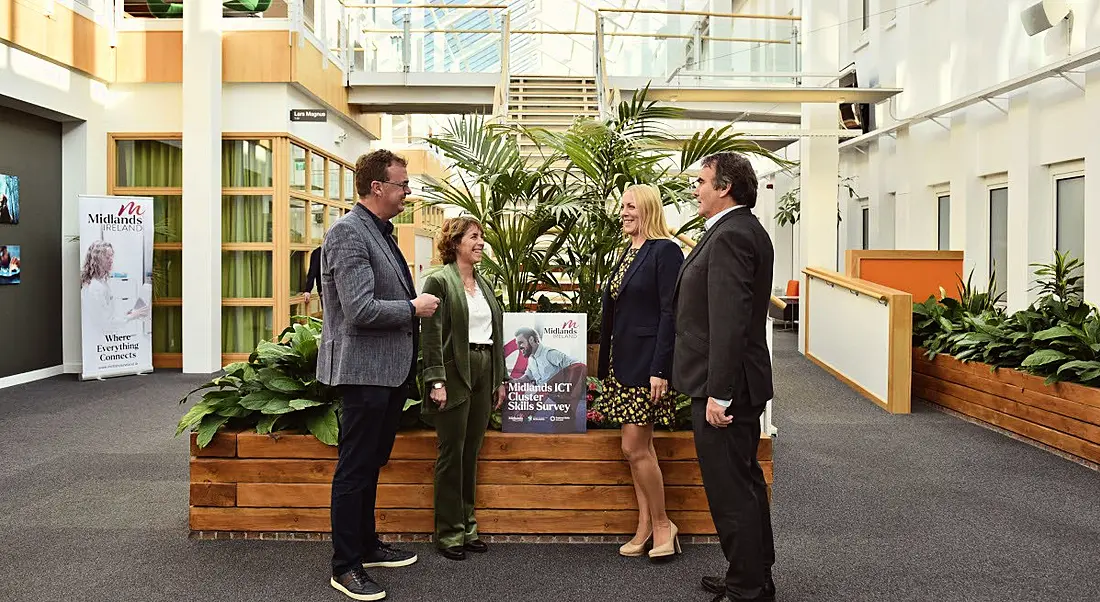The midlands has plenty of critical vacancies for tech staff, according to a report that looked at the region’s chances of becoming an ICT hub.
According to a recently published report, the midlands is fast becoming an Irish tech hub to be reckoned with. Regional companies expect to create up to 800 new ICT jobs over the next three years – and that is in addition to the more than 3,000 people already employed in the sector across the region.
The report was commissioned by the Midlands ICT Cluster and carried out by the Midlands Regional Skills Forum. Both are tasked with looking at the future potential for the midlands as a tech hub and identifying what skills its population needs to focus on in order to achieve this.
To inform their report, the groups circulated a voluntary survey for companies in the region to fill in. The resulting sample frame cited by the survey contains 15 companies which collectively employ more than 3,000 people.
Of the companies surveyed, 47pc classified themselves as ICT-service focused. As well as many companies working in the traditional ICT space, the report identified that the midlands’ tech companies specialise in specific areas such as pharma and medtech, manufacturing and financial services.
Skills needs and ‘critical’ vacancies
Out of all the respondents, currently, more than 70pc have ‘critical’ vacancies for staff. A critical vacancy was defined as one which impacts a business’s key performance metrics. The most common critical vacancies were for tech support, cloud architects, cybersecurity, data analysts, DevOps engineers, back-end and front-end software developers, business analysts, technical programme managers and system architects.
More than 90pc of respondents identified key skills needs for their companies. Of these, more than half cited cloud computing and software development as key skills, while 40pc picked data analytics and AI and machine learning. Despite the national shortage of cybersecurity skills, just 25pc said cybersecurity was a key skills need for them. The report’s authors attributed this to a lack of awareness on the part of the respondents of the dangers of a cyberattack.
Earlier this year, SiliconRepublic.com heard from cybersecurity leader and business-owner Iva Tasheva, who told us that an attack could “terminate a business”.
The report’s recommendations
In terms of addressing the needs of employers around the creation of future talent pipelines, the report’s authors made recommendations including the co-creation of bespoke industry-led courses. Collaboration between educators and industry will be particularly valuable for R&D, they said. Apprenticeships were also mentioned as a way to address skills gaps.
The midlands region has already made some progress with education-industry partnership clusters. The area has a manufacturing cluster that is dedicated to supporting companies operating in Industry 4.0. It was first established in 2021 and is now part of the Technological University of the Shannon.
As these industry partnerships evolve and more receive funding, the midlands can build on its ambitions to become a significant non-Dublin-based tech hub for Ireland, like its counterparts Galway and Limerick.
Sinéad Pillion, industry chair of the Midlands ICT Cluster Steering Committee and head of operations at Ericsson, said the survey “highlights the genuine opportunities that exist supporting the already strong ICT ecosystem in the region”. She stressed the importance of continued collaboration between the cluster and local companies.
John Costello from the Midlands Regional Skills Forum who conducted the survey on skills, talent and education, said that the results “contain a strong endorsement” of work being carried out to enhance the level of skills available “from extensive schools programmes to ICT career pathways and third level qualifications”.
He also pointed to the statistic that more than “60pc of businesses anticipate being able to hire from the pool of talented people already living in the region”.
10 things you need to know direct to your inbox every weekday. Sign up for the Daily Brief, Silicon Republic’s digest of essential sci-tech news.




